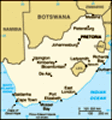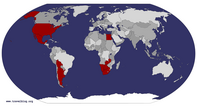Advertisement
Published: July 16th 2008

 Soweto Skyline
Soweto Skyline
The largest township in South Africa.Still entralled with my cloistered lifestyle behind the palace walls, I woke up this morning to utter luxury and to breakfast in bed, still sore from whitewater rafting in what seemed to be a world away.
I had questions.
They were the first questions I asked my driver when I got in for my day tour of Johannesburg and Soweto. They were the first questions I started asking anyone whom I could screw up the courage through my American upbringing to ask, "how do you think things are going since the end of the apartheid government with respect to racism?" and "what is with all these walls?"
You see for me, the racism and classism (which still go hand in hand), and variance in economic prosperity was so readily apparent it was like a slap in the face, but not as apparent to me is the level on the relative scale, how things had been before, not just in the 70s with the riots, but also 10 years ago, 5 years ago. The museums and documentaries don't talk about this.
The question would generally spark a blue streak in anyone I asked, but the responses were all
over the board. I mean all over, from my 20 something driver to the airport saying that racism and the affects of apartheid were completely gone, and the world had this hungover belief that race relations were a question in South Africa (inferring that we were all crazy). I glanced at the 20 foot cement walls topped with barbed wire as he spoke these words, wondering if he had ever been anywhere where this wasn't a common thing. I couldn't help but also wonder if his schooling had drummed this so far into his head as to be almost an automatic response. He was happy enough, a prosperous yound black man, and really seemed to bear zero ill will toward those with the 'looks' of the former oppressors. Its worth noting though, that the Afrikaans speaking 'race' are the ones considered oppressors, and English speaking whites were not in that same class. As a mere 72 hour observer, what do I know, but I certainly felt comfortable here with him. It is also worth noting that this kid had never dealt with the old apartheid government first hand. Sort of like people in their 20s and 30s in Europe and

 Welcome to Town
Welcome to Town
Singles dorms in Sowetothe US (and the world) barely give D-Day a second thought, whereas my Grandfather still holds a serious grudge, and teary eye hatred toward some.
I asked one driver about people on the streets, i.e. there were no whites anywhere, and he basically said exactly that, that white people were scared to come over their walls, though there was no reason at all.. it was just old fear, and a silly shame. They spend every second of their lives behind the walls, in the malls, or in office buildings. And yes I did see some truth to that, but not 100%... Nelson Mandelas house had some pretty high walls, so it was hard to see where the racism issue ended and the classism/poverty crime issues started.
Another guide (and driver) had me out in the middle of town and told me, oh yes, you couldn't be here right now and be safe without me here (a burly friendly black man), but then he added, "but 25 years ago neither one of us could have been there, because a black man and a white woman together would have been a death sentence." (HOW CRAZY IS THAT!!!! in our lifetimes

 No Whites!
No Whites!
Apartheid ran both ways, or all ways. Nobody was allowed to mix and mingle... even afrikaaner and english speaking European ancestry.in a "first world country!") He told me many a mixed race couple, even if they were just friends, suffered such a fate. Its struck me very hard at that moment, that standing here with this man was perfectly normal and natural to me, as I grew up like this, I didn't give it a second thought, but to this man, probably 45, this was a recent enough miracle that it was something that stayed in the current upfront conscious thoughts for him and MANY others around me. I felt as far from the USA as I've ever felt, much farther than in a tent in the middle of the delta in Botswana.
I have to also mention here that some white people I spoke with, particularly older Afrikaaners definitely came across to me as elitist. Of couse, not all of them, and not horrendously, but as an American where we try our darndest to pretend that classes don't exist (despite the fact that they do!) its normalcy made me generally uncomfortable. Also the normalcy at which others accepted it. Weird weird weird. Since I'm going totally non-PC here, I'll just continue this thought thread by wondering out loud
if this is similar to what I find as the 'old habits die hard' old boys club where women really shouldn't have left the kitchen, which I have encountered in numerous gray hair executives in my former job. Men my own age don't seem to have that feeling nearly as often or strongly, and maybe South Africa, some 30 years from now, will not have it either. It will literally die off.
I mentioned this to my tour guide of Soweto. He was by far the most interesting of the characters I had met who were escorting me through this city I couldn't dare go out alone in, even to cross the street. He was a teenager during the Soweto uprising. He was one of those students who was political in that day, who was helping the freedom fighters, who saw the horrors, and who was arrested for "having information for the uprisings leadership" and held for 2 years with no trial and no charges. I asked him how he felt about white people in general. He was poignant, thinking his answer out, "well, I'm healing. I can't say that there aren't parts of me, and many people here
that can forgive, that can like you." he refered to the color of my face, "but this is healing me, and I couldn't be here doing what I do with all the tourists that come here, if I wasn't on my way to feeling okay about it. Meeting people from other places does wonders as you meet people ignorant of all of it, and you can teach them, as they teach you that not everyone judges you by the color of your skin or the language you speak."
I asked him if he felt that his kids and other young adults didn't carry the burden so heavy and the felt less of a separation of people by skin. He quickly said, "oh, education is the only answer, my children grew up with white friends who invited them over for dinner. This is happening and its a great thing. Definitely, younger people are changing the thinking of South Africa". He then quipped with a smile, "my kids are spoilt brats, you wouldn't believe for all the stuff the ask for and then are never satisfied... and I was glad to get a 2nd grade education!" I laughed and mentioned that this was the sure sign of a prospering country where the youth are never satisfied, and can be upset and worked up because they don't have the latest jeans, and nobody will buy them an ipod. "Just wait till the next generation" I told him, and hope that their next generation would truely have a youth that could worry about the silly material things in life, instead of gross injustice, human rights violations and poverty.
Finally I asked him if he 'had done it', meaning was he transporting the documents to the uprisings leadership. He smiled and said, "Absolutely!"
A Soweto tour is worth the money, particularly if you get a driver who has lived there for his entire life. There is a museum built near the site of the first death, Hector Peiterson, in June of 1976 during a student march against the use of Afrikaans in black schools, which sparked the beginning of the struggle to end apartheid, and also incurred international concern, sanctions, and condemnations. (as always, a little too little, and definitely a lot too late). There is a lot of history there, who knows how much accurately portraited, but worthwhile. I came away with my head swimming with opinions on what happened, what was true and what was false, and lots of facts about a timeperiod and era that only minimally touch those of us outside the country. I can say that I felt my question as to how much had change was answered... a holy heck of a lot, and in a relatively short time.
In my questioning of locals I asked if there are many who feel things were better under the apartheid system, knowing I would get an answer of yes from some. Like the end of communism in the Soviet bloc, there are people who were used to being told what to do, and not having to think, or even provide for themselves. Sure enough there are those who find capitalism distasteful and think fondly back to the 'old days' just like most humans do... probably with a bent toward remembering the good and forgetting the bad. Change has its own set of problems, and joblessness, violence, and broken promises have obviously been some of the price that has been paid in South Africa. Still, the vast majority of black, white, mixed, feel that the price was worth it (in my tiny little poll).
Just where they are now, and how much they have to go is not as easy to answer, but I am wholly glad I visited the city, against conventional wisdom, as I feel that I have had a first hand, if short education of the strides this country has made, is making and a tiny feel of what it is like on both sides of the wall and barbed wire fence.
ps. I hope that I haven't offended anyone by these musings, as it is not the intent and this is again just an impression of someone with only a 72 hour education on the matter, and though a pretty worldly person, someone who also grew up in the USA, with my own sets of preconceived notions, etc. It is not 100% comfortable to write about this, but as it was one of the most vivid set of 'different cultures and different ways' I came upon this trip, I thought it a shame not to discuss, despite that race relations the world over is a touchy subject. Anyhow, sorry if I've offended you, I realize these are opinions only, probably not even very informed ones, but so is everything else in this blog!
Advertisement
Tot: 0.112s; Tpl: 0.012s; cc: 10; qc: 54; dbt: 0.0828s; 1; m:domysql w:travelblog (10.17.0.13); sld: 1;
; mem: 1.2mb









